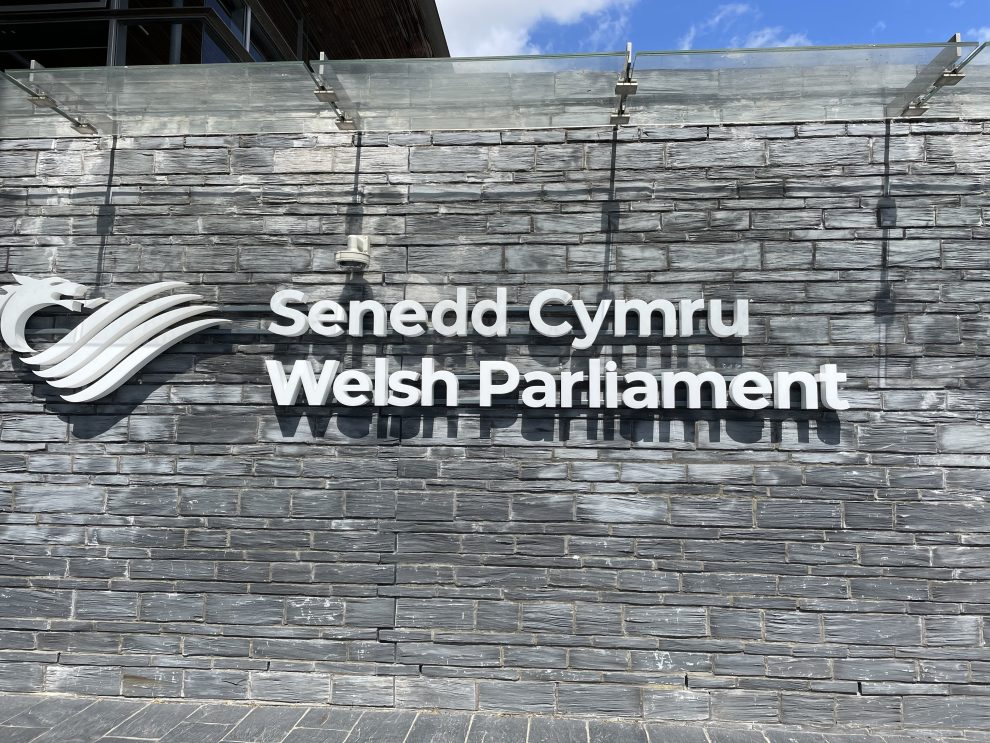Politics
MSs reject calls for public to have their say on Senedd reforms

MEMBERS of the Senedd have rejected calls for the public to be given the final say on contentious plans to expand the Senedd and change the electoral system.
Labour, Plaid Cymru and the Lib Dems voted down a Conservative amendment for a referendum on the Senedd Cymru (Members and Elections) bill.
Under the bill, the size of the Senedd would increase from 60 to 96 members and a full form of proportional representation would be used in elections from 2026.
The 32 constituencies that will be used in the next general election will be combined to create 16 for the next Senedd poll, with each returning six members.
Darren Millar, the shadow constitution minister, argued the overwhelming majority of the public do not support expanding the Senedd nor changing its electoral system.
The Conservative disputed claims there is a clear public mandate for the reforms as he criticised “scant” references to Senedd reform in Labour and Plaid Cymru manifestos.
He accused Plaid Cymru of abandoning a commitment to pursue the single transferable vote electoral system, which would allow voters to rank candidates.
Mr Millar said: “It is abundantly clear that neither Labour nor Plaid Cymru voters at the last Senedd elections have given the green light for the reforms this bill seeks to introduce.”
He pointed out that the Conservative-led UK Government held a referendum on scrapping Westminster’s first-past-the-post system in favour of the alternative vote (AV) in 2011.
Mr Millar argued the planned closed-list voting system, which would see the electorate voting for parties rather than specific candidates, would prove even more unpopular than AV.
He told the chamber: “The reality is you’re all frightened of a referendum because you know full well that those proposals would be roundly rejected by the people of Wales.”
Mike Hedges, a Labour backbencher, pointed out there was no vote on the method of election for police and crime commissioners or mayors in England.
Heledd Fychan, for Plaid Cymru, told the chamber more than 63% of the vote in the 2021 election went to parties that had committed to Senedd reform.
She said: “It is beyond any reasonable doubt that there is a democratic mandate.”
Ms Fychan said there was no referendum on reducing the number of Welsh MPs from 40 to 32, and the UK Government resisted calls for a public vote on its Brexit deal.
Alun Davies, a Labour backbencher, who represents Blaenau Gwent, accused the Conservatives of crying crocodile tears about Welsh democracy.
He said: “If they respected Welsh democracy, we wouldn’t have seen the erosion of the powers of this place week after week, month after month.”
Mick Antoniw, the member in charge of the bill, said a compelling case for reform has been made in expert reports, which have been endorsed by three of the four political parties.
Wales’ constitution minister pointed out that hundreds of new members have been appointed to the House of Lords without a referendum.
Mr Antoniw told MSs the Wales Act 2017, which gave the Senedd control over its electoral system for the first time, does not include any referendum requirement.
Mr Millar also raised concerns about the “unacceptable” potential for a 10% variance in the size of Senedd constituencies from 2030, which is twice that allowed at Westminster.
He said from 2026 all Senedd constituencies will have about 147,000 electors, aside from whichever is paired with the protected Ynys Môn constituency.
Mr Millar explained that the paired Ynys Môn seat could have up to 25,000 fewer electors.
The Tory warned that from 2030 it will be possible for constituencies to vary in size by 30,000 electors or more, which he described as grossly unfair and inappropriate.
He said: “In the interests of fairness and equality of representation for all citizens of Wales, it is important that all MSs represent a similar number of constituents.”
Ms Fychan raised concerns about artificial quotas and unintended consequences, pointing to the example of the new Brecon, Radnor and Cwmtawe seat at Westminster.
The Plaid Cymru MS said: “If there must be a quota then we must include as much flexibility as possible rather than bind the boundary commission’s hands.”
Similarly, Mr Antoniw said introducing a smaller variance than 10% would mean more changes in Senedd constituency boundaries between 2026 and 2030.
He pointed out that there is no numerical limit in Scotland as he stressed the importance of flexibility to respond to matters such as geography and local ties.
MSs voted down the Tory amendment which would have halved variance to 5%.
Following the two-day stage-two debate on March 5 and 6, the bill now moves onto stage three – which will see further amendments debated and is expected to be held in late April.
Community
Cilgerran Church in Wales school petition to be heard

A PETITION opposing proposed changes for a north Pembrokeshire school is to be heard by councillors later this week.
At last May’s meeting, Pembrokeshire County Council considered a report of the School Modernisation Working Group which outlined the findings of a review of education provision in the Preseli area.
A later July meeting backed a general consultation to discontinue Cilgerran Church in Wales Voluntary Controlled School, and to establish it as a 3-11 community school.
“In particular, the review considered the extent of surplus school places in the area, set against a significant decline in the pupil population,” the council in its consultation has said.
The consultation closed on January 30.
Hundreds have opposed the proposed changes, with a petition, on the council’s own website opposing the changes recently closing after gaining 391 signatures.
Any petition of more than 100 signatures triggers a debate at one of the council’s scrutiny committees, in the case of Cilgerran that debate taking place at Pembrokeshire County Council’s February 5 schools and learning overview and scrutiny committee.
The Cilgerran e-petition, created by Louise Williams, raised concerns including the school could become part of a federation, a loss of permanent head teacher on site, a shared head teacher would have to oversee several schools, loss of funding control and the ability to maintain the school’s current healthy and stable funding, and a loss of commitment to the church, in turn could impact on the school’s and pupils values, beliefs and cultural beliefs.
It said: “Ysgol Cilgerran VC school has strong links with the Church community in Cilgerran and we believe this will have a negative impact on the children who attend the school, the community of Cilgerran and the links between the two.
“We are proud of our school ethos and values which are strengthened by our links with the church. The school has close and strong relationships with our Church in Wales federation governors one of which is also our safeguarding governor.
“Our Church Federation governors work closely with the school and are regular visitors to the school and the children. They provide vital support and guidance to the school and have a positive impact on the Children’s education. We believe these links will be weakened by this proposal to remove our VC status and we believe this is an un-necessary action.”
The proposals for Cilgerran are part of a wide range of potential education changes in the county.
Two petitions, opposing the potential closures of Manorbier and Ysgol Clydau schools, were recently heard at full council and a further petition opposing the potential closure of Stepaside School has recently been launched, which has generated enough support to be heard at a future council meeting.
Crime
Welsh Lib Dems urge ministers to rethink rates relief for struggling pubs and cafés

Calls grow for Welsh Government to match support offered to English venues
THE WELSH LIBERAL DEMOCRATS have urged the Welsh Government to review its business rates policy, warning that scaling back support for pubs and hospitality risks further closures across towns and villages.
Party leader Jane Dodds, who represents Mid and West Wales in the Senedd Cymru, said ministers should act quickly to protect local venues after additional support for pubs and music venues was announced for England by the UK Government.
The measures announced by the Chancellor do not automatically apply in Wales, leaving uncertainty over whether similar help will be introduced here.
Hospitality businesses across Pembrokeshire and Carmarthenshire have already reported rising energy bills, higher wage costs and reduced footfall since the pandemic. From April, current business rates relief is expected to be reduced, a move the Liberal Democrats say could place Welsh firms at a disadvantage compared with competitors over the border.
Dodds said that pubs, cafés and restaurants form “the heart of our communities” and warned that withdrawing relief now would be “a serious mistake”.
She told the Senedd that support “cannot stop at pubs alone” and should extend to the wider hospitality sector, including restaurants and family venues that rely heavily on seasonal trade and tourism.
“When questioned, the First Minister said she needed to examine the details of the English package before committing to anything similar for Wales,” Dodds said. “Without urgent action, we risk losing viable, well-loved businesses that communities simply cannot afford to lose.”
The party is also calling for UK-wide action, including a temporary reduction in VAT for hospitality and tourism, funded by a windfall tax on large banks.
However, Welsh Government sources have previously argued that decisions on rates relief must be balanced against pressures on public finances, with ministers required to prioritise health, education and other frontline services within a fixed budget. They have said any additional support would need to be affordable and targeted.
Industry bodies have echoed concerns about the challenges facing the sector. Trade groups say many independent pubs and cafés continue to operate on tight margins, particularly in rural areas where they serve as community hubs as well as businesses.
Local operators say clarity is now key, with decisions on staffing, stock and opening hours often planned months in advance.
With the next financial year approaching, hospitality owners will be watching closely to see whether Wales mirrors England’s support – or leaves businesses to absorb the extra costs alone.
international news
Mandelson quits Labour over Epstein controversy

Former cabinet minister says stepping down is ‘in best interests of the party’ as questions raised over historic payments
LORD MANDLESON has resigned his membership of the Labour Party, saying he does not want to cause “further embarrassment” following renewed controversy over his past links to convicted sex offender Jeffrey Epstein.
The former cabinet minister and one-time UK ambassador to the United States confirmed his decision in a letter to Labour’s general secretary after fresh documents released by the US Department of Justice appeared to reference him in connection with Epstein’s finances.
The files suggest that three payments of $25,000 — totalling $75,000, about £55,000 at today’s exchange rates — were allegedly made to Peter Mandelson in 2003 and 2004.
Lord Mandelson said he had “no record or recollection” of the transactions and believes the allegations may be false, but intends to investigate the matter himself.
In his resignation letter, he wrote that he felt “regretful and sorry” to be linked again to what he described as the “understandable furore” surrounding Epstein.
He added that stepping down from party membership was the responsible course of action while he reviewed the claims.
“I do not wish to cause further embarrassment to the Labour Party,” he said. “I have dedicated my life to the values and success of the party and believe I am acting in its best interests.”
Ambassador role ended
Lord Mandelson had been appointed the UK’s ambassador to Washington by Prime Minister Keir Starmer in December 2024.
However, he was removed from the post last year after earlier revelations about his past friendship and contact with Epstein, including emails showing communication after the financier’s 2008 conviction.
The latest release of files has also included photographs said to show Lord Mandelson alongside an unidentified woman. He said he could not place the location or circumstances of the images.
There is no suggestion that appearing in the documents or photographs indicates criminal wrongdoing.
‘Deep regret’
Earlier this weekend, Lord Mandelson reiterated his regret for ever having known Epstein and apologised “unequivocally” to the women and girls who suffered abuse.
“I want to repeat my apology to the women and girls whose voices should have been heard long before now,” he said.
Epstein died in prison in 2019 while awaiting trial on sex trafficking charges, but investigations into his network of associates continue to generate political fallout on both sides of the Atlantic.
Labour has not yet issued a detailed statement beyond confirming it had received Lord Mandelson’s resignation.

-

 Health5 days ago
Health5 days agoConsultation reveals lack of public trust in health board
-

 News6 days ago
News6 days agoCaldey still unsafe, survivors warn — despite Abbey’s reform claims
-

 Community6 days ago
Community6 days agoPembrokeshire students speak at national Holocaust Memorial Day event
-

 News1 hour ago
News1 hour agoPrincess of Wales visits historic Pembrokeshire woollen mill
-

 News6 days ago
News6 days agoKurtz raises Gumfreston flooding in the Senedd as petition deadline nears
-

 Entertainment7 days ago
Entertainment7 days agoRapunzel brings festive magic to Torch Theatre
-

 Crime7 days ago
Crime7 days agoMan denies murdering brother as jury hears of ‘ferocious attack’ at Morriston flat
-

 Crime4 days ago
Crime4 days agoPembroke man accused of child sex offences sent to Swansea Crown Court



























